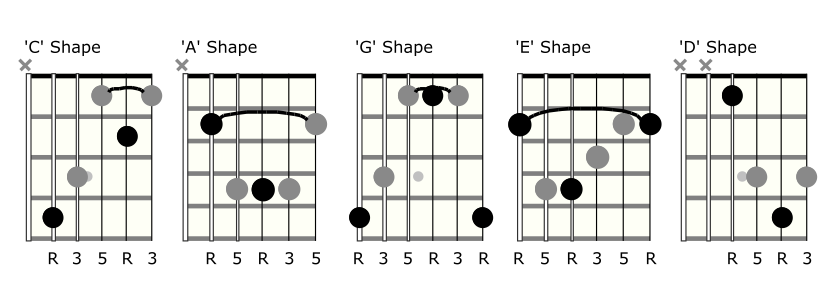Page 1 of 1
Extended chords/avoiding barres - help needed
Posted: Sun Jan 27, 2013 5:23 pm
by Dave
Might have seen this thread talking about my bad index finger. I happened to read up on Tim Buckley and read the following:
During a football game he broke the first two fingers on his left hand, permanently damaging them. He later said that the injury prevented him from playing barre chords. This disability may have led to his use of extended chords, many of which don't require barres.
Initially I've taken a look at a wiki article on extended chords but instantly got overwhelmed with theory. I'm not against plowing into the theory but was hoping someone with am expert grasp (Bacchus Paul, Gabriel, Ultratwin!) might be able to point me at something (a vid or article) that would put this concept in visual terms so i can see how this would avoid so much barring. If not, then any other tips to try out this finger saving notion?
Finally is there any other ways I can mold my playing of chords etc to be less stressful on my index?
Posted: Sun Jan 27, 2013 5:49 pm
by Gabriel
I wouldn't say it's so much about extensions - as then you start getting into jazz territory. It's more about finding comfortable inversions.
I'd refer you to the CAGED system for finding chord shapes that are comfortable, some involve barring but some of them don't.

I use the 'C shape' constantly as I just prefer how it sounds and how it works with other chords.
The best route I'd say would be to just experiment. As long as you understand the basics of chord construction you will be able to experiment to find some comfortable shapes. It's all about adapting to your situation, it may even be worth switching over to 4ths tuning - E A D G C F - as this would significantly change the approach to fretting chords.
Also consider switching over to 3 or 4 note chord shapes, when playing alone they may not sound as satisfying, but in a band context they work brilliantly.
Posted: Sun Jan 27, 2013 5:50 pm
by George
E shape but dont barre it. Use the index on the b or top e string only
Posted: Sun Jan 27, 2013 7:05 pm
by lorez
I found the excellent fretboard roadmap book really helped with this stuff if you don't want to play barre chords
This goes through using triads, partial barres or moveable shapes with adding notes around for a number of extended chords.
Also check out Justin guitars pages on:
Funk & Hendrix -
http://justinguitar.com/en/RH-000-RhythmGuitar.php
Chords -
http://justinguitar.com/en/CH-000-Chords.php
Jazz -
http://justinguitar.com/en/JA-000-Jazz.php
Lots of partial shapes or non barre shapes in their. In fact I think Justin's site is the best free guitar site for learning out there & is more than just a beginners site.
Posted: Sun Jan 27, 2013 7:17 pm
by Bacchus
What Gabriel said. Plus, try those shapes and play the bass note with your thumb, a la Hendrix.
Posted: Sun Jan 27, 2013 7:50 pm
by stewart
there are plenty of ways of creating chords without using barres, you just have to be prepared to fumble around a bit, make use of open strings, drones, etc.
Posted: Mon Jan 28, 2013 4:30 am
by Thom
BacchusPaul wrote:Plus, try those shapes and play the bass note with your thumb, a la Hendrix.
I've done this pretty much since I started playing guitar...much more comfortable. I use a mixture, but if I don't need a very quick change, then I'll always use my thumb on the bass string.
Posted: Wed Feb 06, 2013 9:37 pm
by lorez
Just had a thought about this Dave, if your hands/fingers are stopping you play in standard tuning & making interesting chords have you thought about altered Tunings? Lots of stuff might suit and tuning to a chord might mean simple shapes can be used which would be gentler on the hands.
Also drones/pedal notes can help create interesting harmonies as well as having melodies moving about to make things interesting.
Posted: Fri Feb 08, 2013 1:48 pm
by NickD
Altered tunings were my first thought as well - I use a few.
